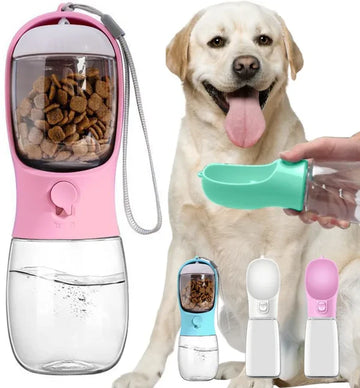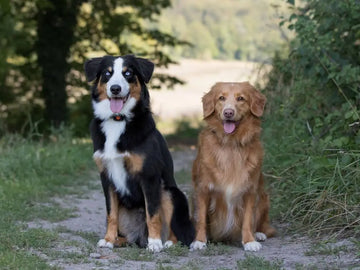Puppies require proper hydration to grow strong, stay healthy, and maintain their boundless energy. Understanding how much water your puppy needs and how to manage their hydration effectively is crucial for their development. Let’s explore everything you need to know about providing the right amount of water for your furry friend while incorporating tips on essential supplies.
Why Hydration Is Essential for Puppies
Water is vital for your puppy's body to function efficiently. It supports digestion, temperature regulation, joint lubrication, and the transport of nutrients and waste. Puppies, with their high activity levels and rapid metabolism, lose fluids quickly, making consistent hydration essential.
Proper hydration also boosts focus during training sessions and keeps your puppy’s immune system strong. Choosing the best dog supplies, such as high-quality water dispensers or spill-proof bowls, ensures your puppy can hydrate easily and hygienically.
How Much Water Does a Puppy Need Daily?
The amount of water your puppy needs depends on factors such as age, size, diet, and activity levels. A common guideline is to provide ½ to 1 ounce of water per pound of body weight each day.
Examples:
- A 10-pound puppy would need about 5–10 ounces of water daily.
- Puppies in warm climates or those engaging in rigorous play may require more water to compensate for fluid loss.
However, this isn’t a one-size-fits-all rule. Regular observation and adjustments are necessary to match your puppy’s hydration needs.
Factors That Influence a Puppy’s Water Intake
Diet and Food Type
Diet plays a significant role in determining how much water your puppy needs:
- Dry food (kibble): Puppies on kibble require more water since it contains little to no moisture.
- Wet or raw food: These diets naturally provide moisture, slightly reducing the need for additional water intake.
Pairing their diet with the right puppy feeders can help regulate their mealtime and water consumption effectively.
Activity Levels
Active puppies expend more energy and lose fluids quickly. Breeds such as Huskies or Retrievers, known for their playfulness, require more frequent water breaks, especially after intense activities like running or training sessions.
Environment and Climate
Puppies living in warmer climates or during hot summer months are at a higher risk of dehydration. Similarly, indoor heating during colder months can dry out the air, increasing their water needs.
Providing Water Effectively
Choosing the Right Bowl or Dispenser
The type of water bowl you use can make a big difference. For puppies, a double-layer drinking water bowl is particularly useful. These bowls are designed to minimize spills and often feature filters to keep water clean. Their ergonomic designs make drinking easy, even for small or playful puppies.
Creating a Routine
Maintaining a consistent watering schedule helps your puppy stay hydrated without overdrinking. Here’s a suggested schedule:
- Morning: Offer water after waking up and before breakfast.
- Afternoon: Provide fresh water after lunch and play sessions.
- Evening: Limit water intake before bedtime to prevent overnight accidents.
This routine not only ensures hydration but also supports house training by managing bathroom schedules effectively.
How to Monitor Your Puppy’s Hydration
Keeping an eye on your puppy’s hydration levels is crucial. Puppies can’t always express thirst, so it’s your responsibility to watch for signs of dehydration or overhydration.
Signs of Dehydration
Dehydration can have severe consequences if left untreated. Look for these signs:
- Dry gums or tongue
- Sunken or dull eyes
- Loss of skin elasticity (skin doesn’t spring back when pinched)
- Excessive panting or lethargy
If your puppy shows these symptoms, provide water immediately and consult your vet.
Preventing Overhydration
While water is essential, overhydration can lead to a rare condition called water intoxication, which can cause bloating, vomiting, and lethargy. To prevent this, monitor their water intake during play or after meals. Offering smaller amounts more frequently can help strike the right balance.
Tips for Encouraging Puppies to Drink Water
Some puppies can be hesitant drinkers, so it’s important to make water accessible and appealing. Here’s how:
- Keep their water bowl clean and odor-free.
- Add a small splash of low-sodium broth to their water for flavor.
- Use ice cubes as a fun way to encourage hydration, especially during hot weather.
- Position water bowls in areas where your puppy spends the most time, making it easy for them to drink when needed.
Using high-quality equipment like puppy feeders or travel-friendly water bottles can also encourage better drinking habits, especially when you’re on the go.
Travel and Hydration
When traveling, ensure your puppy has access to clean water at all times. Portable water bottles with built-in bowls or collapsible containers make this easy. These supplies are particularly handy during long walks or car rides, ensuring your puppy stays hydrated without causing spills.
Best Dog Supplies for Hydration Management
Investing in the right supplies makes managing your puppy’s water intake a breeze. A double-layer drinking water bowl is an excellent choice for everyday use. It minimizes messes, filters impurities, and ensures that water stays fresh. Additionally, combining this with puppy feeders designed for their diet creates a cohesive and organized feeding area.
Practical Advice for Owners
Adjusting Water Intake Based on Activity
If your puppy has had an active day, like playing in the park or attending training sessions, provide extra water to replenish lost fluids. Conversely, on calmer days, slightly reduce their water to prevent overhydration.
Balancing Food and Water
After meals, especially if your puppy eats dry kibble, ensure they drink enough water to aid digestion. Puppies often become thirsty after meals, making this the perfect time to encourage hydration.
Consistency in Supply
Whether you’re at home or traveling, make sure fresh water is always available. Puppies thrive on consistency, and maintaining a predictable water routine supports their overall well-being.
Conclusion
Providing your puppy with the right amount of water is essential for their growth and health. By understanding their daily hydration needs and investing in tools like double-layer drinking water bowls or other puppy feeders, you can make hydration both effective and hassle-free.
Your puppy depends on you to meet their needs, and ensuring proper hydration is one of the simplest yet most impactful ways to support their development. Embrace the joy of watching your puppy grow healthy and happy, knowing that their hydration needs are met every step of the way!










